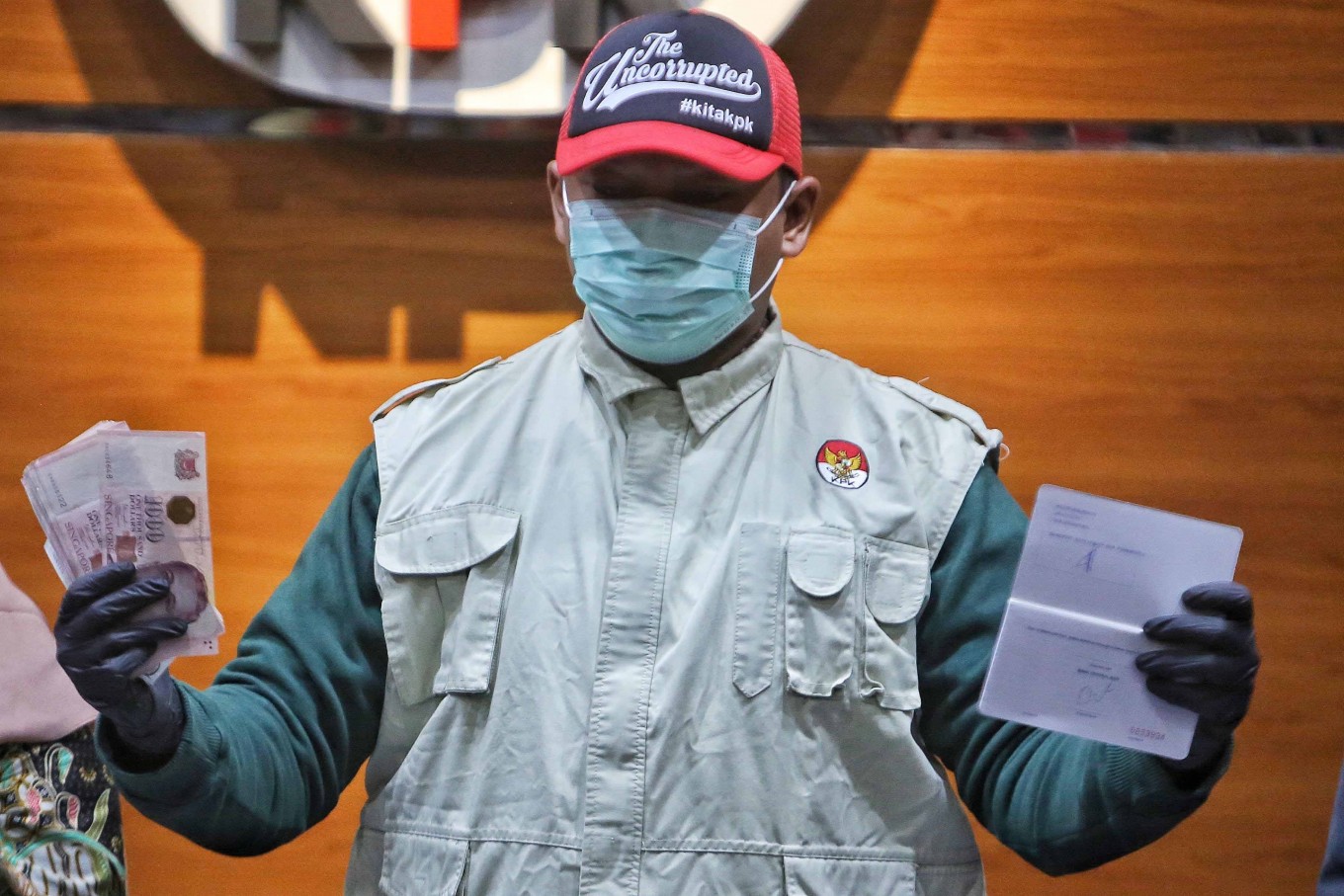Popular Reads
Top Results
Can't find what you're looking for?
View all search resultsPopular Reads
Top Results
Can't find what you're looking for?
View all search resultsKPK may lose investigators who failed civil exam
Top investigator Novel Baswedan among those who did not pass test
Change text size
Gift Premium Articles
to Anyone
S
everal investigators of the Corruption Eradication Commission (KPK) are reportedly set to lose their jobs as frontline fighters against corruption after failing a test required to change their status to that of civil servants.
Reports emerged on Tuesday that around 75 KPK employees failed the civic knowledge test held by the National Civil Service Agency (BKN) as part of the employee status transition within the antigraft body.
The revised KPK Law, which was passed following a speedy deliberation at the House of Representatives in 2019, mandates that all previously independent employees of the agency become civil servants. The law sets a two-year deadline for all parties to implement the change, which is slated to end this year.
As part of the process, the BKN held the civic test for around 1,300 KPK employees between March and April. The agency handed the test results over to the KPK on April 27.
Koran Tempo reported that senior investigator Novel Baswedan was among the employees who apparently did not pass the test.
Joining the antigraft body in 2007, the former police investigator made a name for himself for being involved in the investigation of high-profile cases, including the e-ID graft case that implicated former House of Representatives speaker Setya Novanto.
When working on the e-ID case, Novel fell victim to an acid attack in April 2017, leaving him blind in one eye. After taking a 16-month break to receive medical treatment, Novel resumed his position as investigator in July 2018.
Novel said he acknowledged a possibility that he would lose his job for failing the civil test.
“Should the information be proven to be true, I would certainly be surprised, because this would be the first time an attempt [to oust independent investigators] is made by the KPK leadership itself,” Novel said, as quoted by tempo.co.
The KPK leadership issued an internal regulation in January requiring all employees to take the civil knowledge test as part of their status transition to civil servants.
Other employees, who wished to remain anonymous, claimed the civic test was not relevant for their work as KPK employees. They added the test was akin to an ideological screening.
The questions they had to answer during the test, the employees claimed, included some questions related to religious beliefs and ethnic affairs, such as whether someone accused of blasphemy should be punished. The test-takers were also reportedly asked about their opinions on LGBT issues and on the now-disbanded Muslim group Hizbut Tahrir Indonesia.
The BKN said the test questions were formulated based on assessments with several state bodies, including the State Intelligence Agency (BIN), the National Counterterrorism Agency (BNPT) and the Indonesian Military (TNI).
The agency further claimed the test was conducted to ensure the antigraft employees met the requirements for becoming civil servants. Not being part of organizations banned by the government as well as pledging allegiance to the state ideology Pancasila, the 1945 Constitution and the government are some of the requirements.
The KPK dismissed the report, saying it had yet to open the results received from the BKN.
“The test results were still sealed and stored well at the KPK headquarters,” KPK secretary-general Cahya Harefa said in a statement on Tuesday. “We’ll announce the results immediately to all stakeholders for the sake of transparency.”
Activists have criticized the antigraft body for the test, calling it the final nail in the coffin for the KPK and its independent employees.
Amnesty International Indonesia executive director Usman Hamid said the civic test should not serve as a cover for getting rid of KPK employees who hold different political views to the ruling government.
He likened the civic knowledge test to the bersih lingkungan (clean status) letter issued by Suharto’s New Order regime to prove someone was not affiliated with the Indonesian Communist Party (PKI).
“According to international human rights standards and Indonesian law, [KPK] employees should be assessed based on their performance and competence, not their ideology,” Usman said in a statement.
Gadjah Mada University legal expert Oce Madril said the KPK should have implemented tests that measure its employees’ capability in maintaining independence upon performing their duty during the transition period.
He added that the commission’s method for selecting potential employees was already rigorous enough in measuring their capabilities and integrity; thus, it was not necessary to perform additional tests on them.
Also on Tuesday, the Constitutional Court declared several articles in the revised KPK Law unconstitutional, granting several judicial review petitions against the law filed by lecturers of the Indonesian Islamic University (UII) in Yogyakarta.
Among the articles declared unconstitutional were provisions requiring KPK investigators to secure a permit from the commission’s supervisory body before conducting wiretapping, confiscation or a raid against a graft suspect. The justices ruled that KPK investigators only needed to report the wiretapping, raid and confiscation to the supervisory body.
While the justices also pronounced the KPK to be an independent executive body, they upheld the law’s provision mandating a status transition for KPK employees from independent employees to civil servants.
The court rejected a petition against the law’s revision filed by several former KPK leaders, including Agus Rahardjo, Laode Muhammad Syarif and Saut Situmorang. The justices dismissed their argument that the law had not been deliberated openly, arguing that the House had held several meetings and hearings with members of the public prior to revising the KPK Law.
Your Opinion Matters
Share your experiences, suggestions, and any issues you've encountered on The Jakarta Post. We're here to listen.
Thank you
Thank you for sharing your thoughts. We appreciate your feedback.










